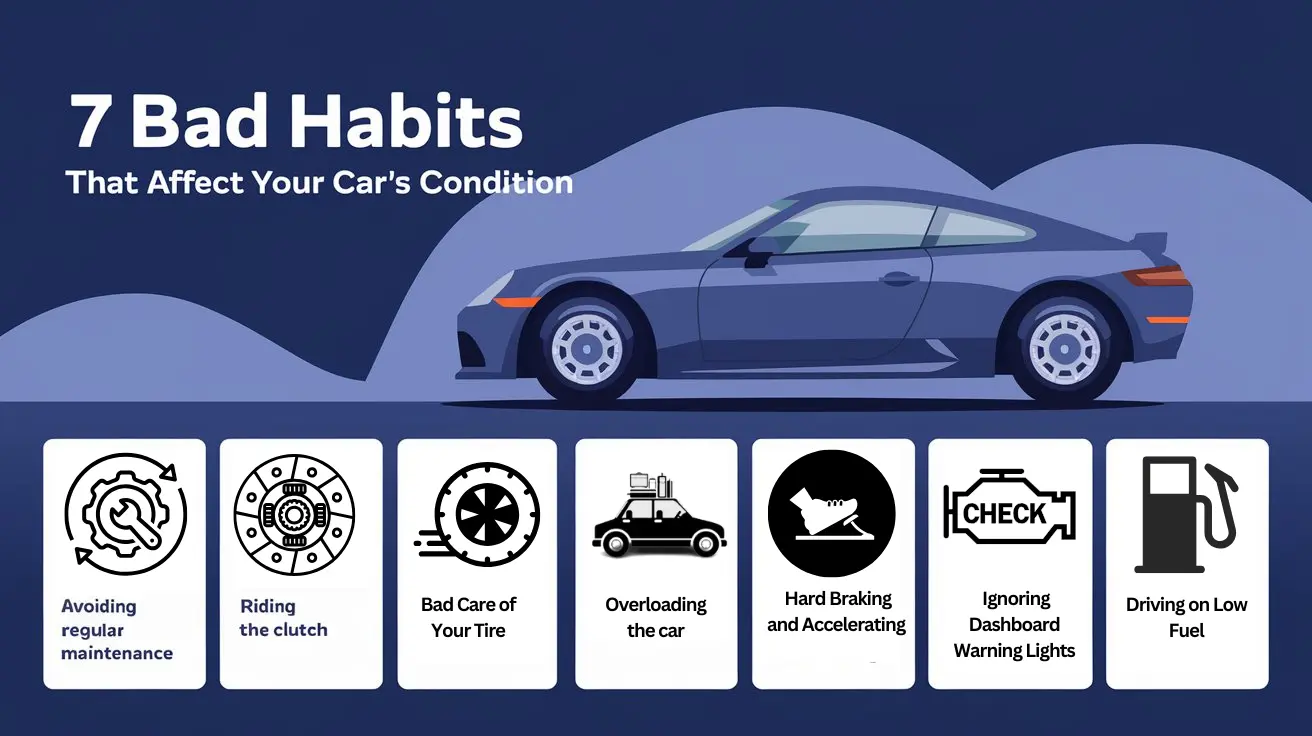 Date: December 24, 2024
Date: December 24, 2024
Ever wondered why your car requires repairs so often? If you're someone who drives daily, the wear and tear on your vehicle is inevitable, but bad driving habits can make things worse. You don't know it, but every time you do some of those things while driving, you might be unconsciously straining your vehicle in ways that don't have to happen. Small or seemingly harmless habits accumulate and eventually result in significant problems that will lead to costly repairs and early vehicle wear. While routine maintenance and frequent checkups are some important preventive measures, there is only so much they can do if bad driving habits are not addressed
Common Bad Habits Damaging Your Car
Bad habits can significantly reduce the lifespan and performance of your car, leading to costly repairs and potential safety risks. Many drivers unknowingly practice behaviors that can harm their vehicles over time. These habits, if left unchecked, may not only affect the car’s efficiency but also compromise its safety and reliability.
Here are the important Common Bad Habits Damaging Your Car that every vehicle owner should be aware of:
Avoiding Regular Maintenance
One should first consider regular vehicle maintenance as its basis. Skipping oil changes, inspections, and fluid replacements might seem harmless in the short run, but it can lead to very expensive repairs in the long run. For example, not regularly changing your oil causes your engine to build up sludge, which can cause poor performance or even complete engine failure.
Regular servicing also involves tire rotation, brake checks, and fluid top-ups. Failure to do these can result in serious mechanical problems down the road, so it is important to follow your car's maintenance schedule to keep it in prime condition.
Riding the Clutch
A common bad habit for people who drive manual cars is riding the clutch, which will cut the lifespan of your clutch system by more than half. It happens when the driver leaves their foot on the clutch pedal after changing gears or during hill starts. This unnecessary strain causes excessive wear on the clutch plate, and that costs money to repair.
Avoid this by fully releasing the clutch after a gear change. When doing hill starts, keep your car in neutral while having the handbrake on until you are ready to move. This will ensure the healthiness of your clutch system and avoid early repairs.
Bad Care of Your Tire
Our car's tires carry the entire weight of the car and are the only points that touch the road. Neglecting tire care, like checking on tire pressure or letting them wear out, causes tremendous damage to your car's alignment and suspension system. These can lead to poor handling and reduced fuel efficiency as well as safety hazards on the road.
Check your tire pressure from time to time and replace worn-out tires. This helps ensure better performance, safety, and longevity in your car.
Overloading the car
Every vehicle has a weight-carrying capacity, and overloading impacts very severely. The suspension, engine, and transmission work under too much stress while overloaded. Generally, an overweight engine works harder, hence overheating and wearing out rapidly. Also, overloading your car can impact one's braking performance and fuel efficiency.
Always check your car's load limit and never take along things that do not matter. Light traveling increases your car's performance and mileage as well.
Hard Braking and Accelerating
Aggressive braking and accelerating also exert extra stress on your car's brakes, tires, and the other components of the engine. The more you hit the brakes or pump on the accelerator, the more you're exerting extra stress on the automobile parts, and hence they live shorter.
Driving smoothly and gradually, using controlled acceleration and braking, prolongs the life of your vehicle. This helps to improve fuel efficiency as well as maintain the long-term health of your car's components.
Ignoring Dashboard Warning Lights
Your car's dashboard holds warning lights, but for very good reasons. They warn you of problems with your engine, battery, brake, and other vital parts of the car. Many motorists ignore such signs or take too long to see a mechanic, which further aggravates the problem.
Whenever the warning light turns on, there is an immediate need to solve the problem. Minor dashboard signals can easily put your car under pressure, resulting in serious damage. A low oil pressure or failing airbag may result in a minor problem becoming serious if one fails to correct it as soon as it appears. Your dashboard warning lights are meant to protect you and your car; do not ignore them.
Driving on Low Fuel
It may seem innocuous enough to drive the car on a near-empty tank, but it more often than not causes serious damage to your auto's fuel system. On a low gas, the gasoline pump ingests some air, overheats, and fails much too early. And low gas levels raise the likelihood of debris clogging up the fuel lines.
To prevent this, your tank should at least have a quarter filled all the time. These habits will protect your fuel pump and keep it performing well.
Consequences of Bad Habits
The implications that relate to bad driving habits may range from poor car lifespan to compromised safety for both the driver and the passenger. The following are some of them:
Lower Lifespan for Your Car: Bad driving habits or aggressive driving will leave your car with less years of life and have you spending much earlier than you expected.
Rapid Wear and Tear: Over time, your bad driving behavior will promote the wear and tear of your car's most important parts and will require constant repair and replacement.
Low Mileage per Gallon: Practices like braking hard, accelerating hard, and overloading your car decrease fuel efficiency and increase running costs.
Higher Maintenance Costs: Ignoring minor problems or overusing it will lead to high-cost repair in the long run.
Increased Chances of Accident: Bad driving habits like frequent hard braking, fast acceleration, and neglecting warning signs lead to accidents and collisions.
Wear-Out Safety Features: Overstraining vital safety components, such as brakes and airbags, may cause them to fail at a critical moment.
Tips to Break These Bad Habits
The good news is that bad driving habits can change. These are some handy tips on how to drive smart and keep your car going for long:
Follow a Regular Maintenance Schedule: Regular oil changes, brake inspections, and tire rotations can keep your car in good running condition.
Practice Smooth Driving Techniques: Avoid hard braking and rapid acceleration. Gradual acceleration and braking will save the components of your car and will also save fuel.
Check Tire Pressure and Condition: Regularly check tire pressure and inspect tires for wear. This will enhance vehicle safety and handling.
Avoid Overloading: Stick to your car's recommended load capacity to avoid stressing the engine, suspension, and transmission.
Address Warning Lights Immediately: Be aware of dashboard alerts and have these checked and serviced right away to avoid more severe damages.
Keep Your Fuel Tank Adequately Filled: Ensure your fuel tank is never too low to prevent damage to the fuel pump and avoid debris clogging the fuel lines, which can lead to costly repairs.
Importance of Professional Car Care
Even with the best intentions, bad driving habits lead to considerable damage to your car. Through professional car care, these damages can be reversed and your vehicle kept at its best. Regular inspections by trusted mechanics ensure that small issues do not turn into major ones.
If you notice any signs of damage or wear caused by bad habits while driving, go to a reliable service center. Reliable auto repair shops can help restore your vehicle back to its optimal performance and prevent further damage.
Don't let bad habits get to your vehicle; start driving smarter today!
